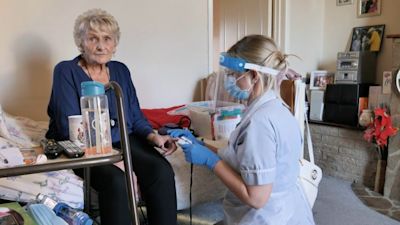Insight
Hundreds of medically fit patients spending weeks in hospital due to lack of community social care

For her series Fight on the Frontline ITV News Health Editor Emily Morgan and her team are visiting three different hospitals over three days to focus on the three major issues facing the NHS: staffing shortages, bed capacity and demand.
With the health service declaring itself on a "war footing" as it battles with winter pressures and rising Covid cases amid the Omicron wave, Emily Morgan will speak to those who are fighting on the frontline to find out what it all means for them and those for which they care.
A week ago, I visited Wolverhampton Hospital where I sat in on a bed management meeting.
I was shocked to hear 131 patients were ready to leave the hospital but couldn’t be discharged because there were either no staff to safely take them home or their care home was closed due to staff shortages or a Covid outbreak.
131 people is four wards worth of patients.
Thursday was the same. In the Royal Bournemouth Hospital, there were 200 patients fit to leave.
This is one of the major issues facing the health service at the moment. Those unable to leave hospital are clogging up the system so hospitals can’t get other patients into wards.
I have been asking all week what the answer is. Most people I ask, simply shrug their shoulders and say they don’t know.
The medical commander in Bournemouth did have one answer, they are taking over hotels to transfer patients into. It begs the question: how long can that go on for?
The long term solution is to get patients back home and care for them there, which is exactly what Portsmouth rapid response team does.
The unit is made up of health and social care professionals, from nurses to physiotherapists and paramedics. Their job is to respond to callouts in the community, help care for patients with chronic illnesses at home and ensure patients can be discharged from hospital safely.
Listen to ITV News' podcast - Coronavirus: What you need to know
I met the team on Friday and was taken aback at how dedicated and hard working they all were.
In the morning meeting they chatted through their clients, worked out who needed what and discussed how many discharges or transfers were required that day. They then went their separate ways to visit those in need.
The point about this community team is that they are healthcare professionals doing their job in the community, ensuring patients don’t need to go to their GP or end up in A&E.
They are literally helping keep patients well to ensure hospitals and the ambulance service can run smoothly.
Both Valerie and Pam, who I met in their own homes, had recently been to hospital.
Valerie had to wait in the back of an ambulance and be treated there.
Pam had just spent 59 days in hospital, desperate to leave and get back home where she was more comfortable.
In both instances, it was the rapid response teams, who made sure they got home, who are now caring for them in their home and checking on them regularly.
This is how it should be, said Natalie, the nurse I was following for the day.
The problem is Covid has thrown a spanner in the works. With so many staff members sick or off isolating, things are taking longer and started to break down.
That is why hospitals are so full, and what this winter has really taught us is how important that relationship is - the health service and community healthcare have to work hand in hand.
But when it breaks down, as Covid has proved, the hospitals, from A&E to discharge, seize up.